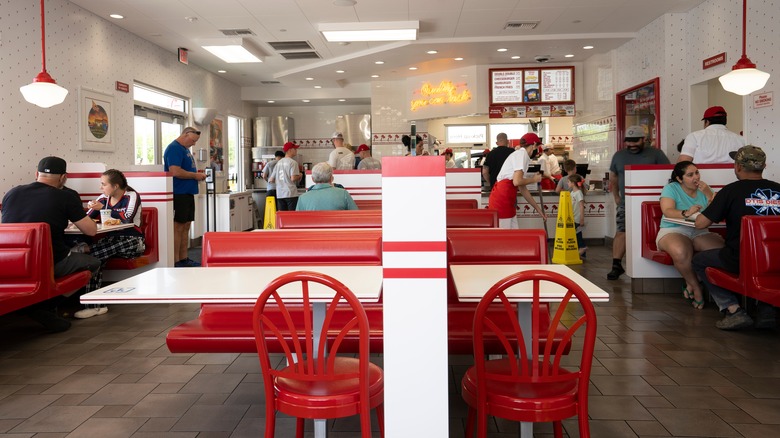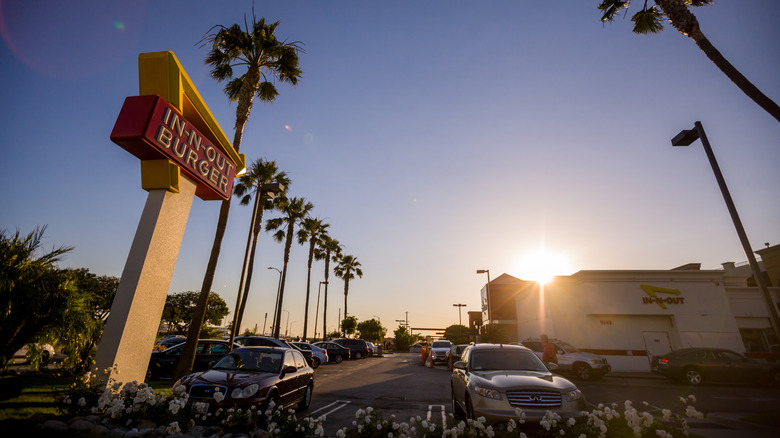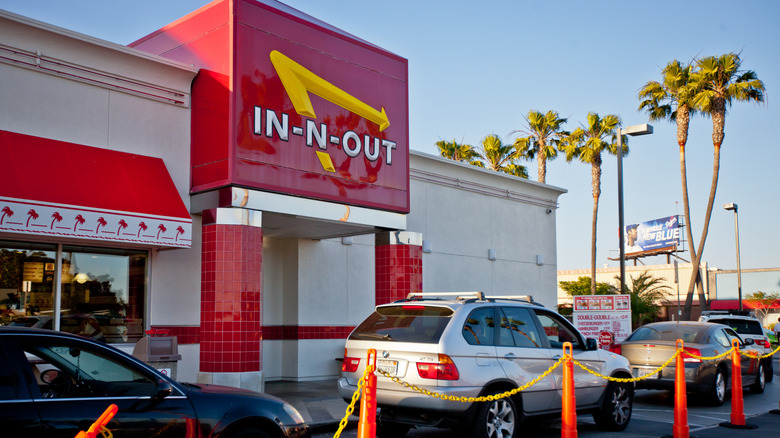In-N-Out Burger's Alleged New Mask Policy Is Causing Controversy
UPDATE 7/21/23: In-N-Out Burger responded to Daily Meal's request for comment regarding its current and updated policy on employee masking.
West Coast chain In-N-Out Burger enjoys a pretty glowing reputation. It seems to be one of the only fast food brands impervious to criticism from even the highest culinary echelons, counting celebrity chefs like Alton Brown and the late Anthony Bourdain among its rabid, not-so-secret menu-loving fan club. And yet, the company has come under fire multiple times for its political stances, aligning with a Conservative Christian ethos that has been criticized for, among other things, anti-LGBTQ policies. But while similarly-aligned brands such as Chick-fil-A have sparked boycotts over these issues, In-N-Out hasn't faced the same backlash.
Things shifted a bit during the COVID-19 pandemic, an event that put corporations' political standings in the spotlight. In-N-Out made headlines in 2021 when one of its San Francisco locations was temporarily closed by the city's Department of Public Health for violating a local vaccine mandate. According to the San Francisco Chronicle, In-N-Out responded by calling vaccine mandates "intrusive, improper, and offensive."
Now, the company's pandemic stances have landed it in hot water again, as a tweet from Dr. Lucky Tran, a molecular biologist who frequently writes about public health issues for The Guardian and other outlets, alleges that In-N-Out is banning its employees from wearing masks. Tran's tweet includes an apparent internal memo from In-N-Out executives stating, "No masks shall be worn in the Store or Support facility unless an Associate has a valid medical note."
In-N-Out's alleged mask ban comes in the name of customer service
The statement goes on to explain that medical notes can only be accepted if the employee has a specific medical condition that requires them to wear a mask and that the note must also state the expected duration of that condition if that can be determined. If employees present such a note, they will be permitted to wear a mask; however, they are required to use N-95 masks provided by the company.
What is the reasoning behind In-N-Out's purported mask ban? According to the memo, the mandate is intended to "emphasize the importance of customer service and the ability to show our Associates' smiles and other facial features." Also of note is the fact that the memo is addressed to employees in Arizona, Colorado, Nevada, Texas, and Utah. That leaves two states where In-N-Out operates — California and Oregon — that are apparently exempt from the mandate.
If the information provided by Dr. Lucky Tran is indeed accurate, it could potentially spell legal trouble for the fast food chain. In 2021, the Occupational Health and Safety Administration (OSHA) fined a Massachusetts tax company for prohibiting employees from wearing masks.
In-N-Out clarified their employee masking policy
Though representatives from In-N-Out Burger did not immediately respond to Daily Meal's initial request for comment, Chief Operating Officer Denny Warnick clarified the fast food chain's stance on the matter in an email sent on July 20, emphasizing the belief that wearing a mask "promotes a more distant and disconnected environment" for employees and customers.
"At In-N-Out Burger, we've communicated with our smiles since 1948, and a smiling Associate helps to set a warm and inviting atmosphere in our stores," wrote Warnick. "We believe that wearing a mask literally adds a barrier to communication — much of which is nonverbal — and promotes a more distant and disconnected environment."
Warnick also stated that the company, in an effort to continue "balancing these fundamental values while still accommodating the specific circumstances affecting our Associates," has as of now, "updated our internal guidelines" in an effort to allow employees who require medical accommodations to don masks during work hours. Per Warnick's email, the policy will officially be instituted on August 14, "where local regulations allow.


